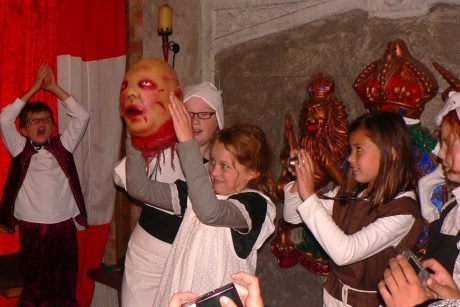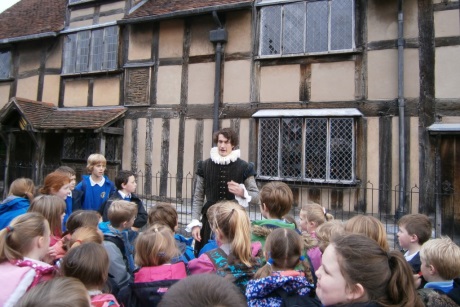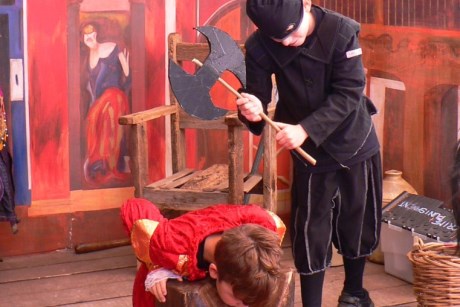
Tudor World provides children with an insight into the Elizabethan period and Shakespeare’s England, and ties into History, Drama and English studies.
The attraction is a period building and museum in Stratford-upon-Avon that is Council for Learning Outside the Classroom accredited.
It caters for children aged between five and 14, and a school trip involves students learning mainly about English history, accompanied by costumed guides.
A typical day at Tudor World
A day at Tudor World starts at 10am. Costumed guides greet the children before briefing them on what the day will entail. Plus, the class finds out that they’ll be meeting William Shakespeare later in the day.
What follows is a tour of the museum with a historian. Along the way, pupils are educated about the history of the old building, the English monarchy, and the spreading of the plague.
There are recreations of how the plague affected society, plus markets and throne rooms in the museum for an authentic learning experience.
The middle of the visit is dedicated to interactive workshops, taking place in the museum, theatre area, and workshop room.

The school trip ends with a tour of Stratford, led by costumed character William Shakespeare. The actor takes the children around parts of Stratford upon Avon while informing them about different aspects of his life.
Here, students are given the chance to learn about Shakespeare first hand by asking questions to the man himself. This activity lends itself to both English studies and History.
A choice of workshops
All learning sessions have cross-curricula links and are designed to raise spiritual, moral, social and cultural issues.
The class will take part in a series of fixed workshops. These will focus on chronological British history, changes in social history, how national history is reflected in local history, and the lives of significant individuals in the past who have contributed to national and international achievements.
These learning sessions will be followed by another workshop – the topic of which is chosen by the teacher prior to a visit. The topic-specific workshops cover crime and punishment, health and medicine, or entertainment.
For example, during the crime and punishment workshop, children can meet a gaoler. They can also take part in a fake trial, which might include the children being put into the pillories, sat on a ducking stool or shown how a scold’s bridle works.
In a health and medicine workshop, students can meet a plague doctor and learn some grisly facts about historic illness remedies, while an entertainment workshop explores what sort of recreational objects the Tudors had during the period, and what two main sports they participated in.

Handling artefacts
There are a number of artefacts on site that young people are able to handle and use to gain a useful perspective on the life of the Tudors.
These include the scold’s bridle (a device used for the punishment of nagging wives), a plague mask used for the doctor on his rounds, and fashionable Tudor clothing of the day worn by nobles and gentlewomen alike.
There are also various smelling boxes for young people to work with. Children can use these boxes to discover smells of a Tudor Market, a ship at sea or the deadly plague.
Teaching resources
Teachers can access a series of resources to aid a school trip. Free guided familiarisation trips are available, as well as free lesson plans that are sent to the school prior to the trip.
And afterwards, pupils will be able to tie their visit into classroom action by completing various activities that are provided by Tudor World.
These include writing letters to various nobles, designing Shakespeare's next sonnet, and counting Tudor money.
Teachers can book a trip to Tudor World by calling 01789-298070 or visiting www.tudorworld.com.










